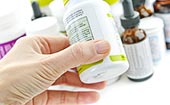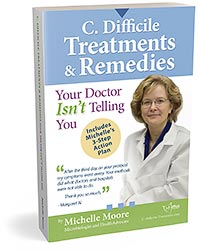 Antibiotics often fail as a C. diff. treatment, and the failure rate goes up if you’ve had recurring infections. As the effectiveness of antibiotics has fallen, a new and rather unorthodox procedure has risen to the forefront for C. diff. treatment.
Antibiotics often fail as a C. diff. treatment, and the failure rate goes up if you’ve had recurring infections. As the effectiveness of antibiotics has fallen, a new and rather unorthodox procedure has risen to the forefront for C. diff. treatment.
Fecal transplantation seems very promising based on recent study results, but the procedure is not without risks. And there are significant and often overlooked problems with fecal transplants that everyone with C. difficile should know.
The Failure of Antibiotics
For people’s first C. diff. infection, antibiotics work about 74% of the time. But if it’s your second bout of C. difficile, then antibiotics are only 60% effective. And the numbers get worse if you’ve had multiple infections in the past1. Antibiotics can also have severe and sometime dangerous side effects and they can do lasting harm to your gut flora and your immune system.
Most doctors still prefer antibiotics for people’s first or even second infection. But as the number or recurring infections go up, some doctors are relying more and more on fecal microbiota transplantation (FMT), also known as a stool transplant and fecal transplant.
The Scoop on Poop
The underlying cause of a C. diff. infection is an unhealthy balance of bacteria living inside the gut. This imbalance often happens after taking antibiotic drugs for some other kind of infection.
The idea behind a fecal transplant is to restore a healthy population of flora inside an infected person’s gut by borrowing flora from a healthy person’s gut. The basic procedure is to take fecal matter from a healthy person’s stool and put it into the intestines of a person with C. diff.
While the procedure seems unusual, several studies show that fecal transplants usually work, at least in the short term. In a 2013 study1 suspended stool from healthy donors was transplanted into C. diff. patients via tube. Fecal transplantation had a 94% success rate, compared to a much lower 23% success rate for Vancomycin antibiotic therapy, which is the standard treatment for recurring C. diff.
In a 2015 study2, purified bacteria taken from donors was placed into capsules taken orally. After 90 days, 89% of patients in the study had success with the capsules, although 32% required a second treatment for success.
A 2011 review of 317 patients showed a 92% success rate and a low incidence of side effects with fecal transplantation3. The American College of Gastroenterology in 2013 said that there are no adverse effects or complications related to this procedure have been described in clinical studies4. But despite the promising study results and low side effects, there are still risks associated with fecal transplants.
The Problems with Poo
Understandably, the idea of putting other people’s fecal matter into your body is quite unpleasant to many people. But there are other downsides to fecal transplantation that are not so obvious. Below is a list of the cons and potential risks associated with fecal transplants.
- The “yuck” factor. As mentioned above, the whole idea behind the procedure is repulsive to some people, which can complicate and possibly interrupt the treatment process. Thankfully, new methods using purified or even synthetic fecal matter seem just as effective as traditional transplants.
- Infection risk. Infections have passed from the donor to FMT recipient. Multi-drug resistant E. coli has killed one person and sickened another, causing the FDA to issue a warning on this procedure.
- Viruses pass through fecal transplants. The fecal matter of donors is screened for common disease causing bacteria and viruses, but the screening is by no means complete. Screening will not identify less common viruses and bacteria that can cause diseases. A 2016 study proved that viruses do get transferred from the donor to the recipient in traditional fecal transplantations 5.
- Toxins pass from donor to recipient. The colon acts like a trash can for toxins dumped from the blood and liver. A 2013 study6 suggests that temporary fevers and elevated CRP levels that indicate inflammation show that toxins can be passed from a fecal matter donor to a transplant recipient.
- Risk of side effects. While fecal transplants may have fewer problems than antibiotics, the procedure is not without risk or side effects. The majority of transplant side effects are mild, including temporary gut discomfort, diarrhea, fever, nausea and constipation7. But more serious reactions can occur in some people and it’s best to discuss the risks with your doctor before getting a transplant.
- Long-term microbiome instability. Some experts are concerned about how fecal transplantation could affect gut flora diversity and stability in the long run. While the short-term results as a C. diff. treatment appear good, the long-term side effects of this relatively new therapy are not fully understood.
- Not a miracle cure. Some people do not react well to fecal transplants and the procedure is not 100% effective. And the long-term effectiveness of this new technique is largely unknown. Unless other steps are taken to support your immune system, clean up your diet and practice a microbiome-nurturing lifestyle, you may only experience temporary results from a fecal transplant.
I’m not trying to bash fecal transplants, but like most things, there are pros and cons. The pros are that it’s a fairly simple procedure and it works most of the time (at least short-term). Most common side effects are also mild and they bypass all the dangers and side effects of antibiotic drugs. But the cons are that it’s not a miracle cure, there are potential risks and it’s only a short-term solution for many people.
I’ve heard from many people who’ve had good results with fecal transplants, but I’ve also heard from people for whom the procedure did not work. And some people have trouble finding a doctor who can perform the procedure.
How to Get a Fecal Transplant
 Due to the high success rate of fecal transplants, a growing number of doctors and facilities are providing this once alternative therapy. But while fecal transplants are becoming mainstream, it can still be a challenge for some people to have the procedure done.
Due to the high success rate of fecal transplants, a growing number of doctors and facilities are providing this once alternative therapy. But while fecal transplants are becoming mainstream, it can still be a challenge for some people to have the procedure done.
First, you have to find a doctor (or get a referral to a specialist) who performs the procedure. Second, a donor needs to be found. Usually the donor and recipient are not identified to each other for privacy’s sake. Donors are typically screened for diseases including HIV, hepatitis, parasites and other pathogens first. The method of delivering the fecal matter to the recipient varies, but can include:
- A nasoduodenal or similar tube (a tube that is inserted into the nose that goes directly into the small intestine)
- An enema (the process of adding liquids into the rectum through the anus)
- Through a colonoscopy, fecal material can be directly added into the colon
- A gelatin-coated capsule. A Canadian doctor has improvised a “pill” form you can take by mouth that contains the donor fecal material (this form of the therapy is not yet widely available to the public as of yet) 8
- A synthetic stool substitute has been formulated from growing and purifying intestinal bacteria in a laboratory from a single donor. This method helps eliminate concerns about pathogen or disease transmission from the donor 9
Correct the Underlying Conditions
 As mentioned above, while short-term results of FMT procedures are promising, long-term results carry unknown risks. Before you move onto trying a fecal transplant, you may want to try out less-invasive alternative treatment methods. Most people have never heard about these methods and certainly not from their doctor.
As mentioned above, while short-term results of FMT procedures are promising, long-term results carry unknown risks. Before you move onto trying a fecal transplant, you may want to try out less-invasive alternative treatment methods. Most people have never heard about these methods and certainly not from their doctor.
Natural antibiotics have been used for centuries to treat illnesses, and they range from antibacterial essential oils to herbal extracts. Natural approaches also include fermented foods and probiotics to replenish the GI system and crowd out C. difficile bacteria. However, most supplements and probiotics available in stores are not of sufficient potency to deliver a punch against these tough bacteria.
Also important are the foods you are eating to support your healthy bacteria. Equally important are foods you shouldn’t eat that are hidden sources of antibiotics that will suppress your good gut bacteria which can prolong your infection.
Addressing C. diff. is more than just a pill or treatment against bacteria. It’s about addressing and correcting the underlying conditions that make C. diff prosper in your GI system. For complete details on my full program for addressing C. difficile, be sure to get a copy of my latest book here.

About the Author – Michelle Moore, BSc
Michelle Moore is a microbiologist, holistic health educator, and author of C. difficile Treatments & Remedies. With over 10 years of experience in pharmaceutical research and over 20 years in natural medicine, she helps people overcome C. difficile and other chronic infections naturally.
References
- Duodenal Infusion of Donor Feces for Recurrent Clostridium difficile. N Engl J Med 2013; 368:407-415
- Effectiveness of fecal-derived microbiota transfer using orally administered capsules for recurrent Clostridium difficile infection. BMC Infect Dis. 2015; 15: 191. https://www.ncbi.nlm.nih.gov/pmc/articles/PMC4506624/
- Systematic Review of Intestinal Microbiota Transplantation (Fecal Bacteriotherapy) for Recurrent Clostridium difficile Infection. Gough, E., Shaikh, H., Manges, A., Clinical Infectious Diseases 2011;53(10):994–1002
- Guidelines for Diagnosis, Treatment, and Prevention of Clostridium difficile Infections. Christina M. Surawicz, Lawrence J. Brandt, David G. Binion, Ashwin N. Ananthakrishnan, Scott R. Curry et al. Am J Gastroenterol 2013; 108:478–498; doi:10.1038/ajg.2013.4; published online 26 February 2013
- Transfer of Viral Communities between Human Individuals during Fecal Microbiota Transplantation. Chehoud C, Dryga A, Hwang Y, Nagy-Szakal D, Hollister EB, Luna RA, Versalovic J, Kellermayer R, Bushman FD. MBio. 2016 Mar 29;7(2). pii: e00322-16. doi: 10.1128/mBio.00322-16
- Temporal Bacterial Community Dynamics Vary Among Ulcerative Colitis Patients After Fecal Microbiota Transplantation. The American J of Gastroenterology (2013) 108, 1620–1630 (2013)
- Systematic Review: Adverse Events of Fecal Microbiota Transplantation. PLoS One. 2016; 11(8): e0161174
- ‘Poop’ pills can treat C. difficile, Calgary doctor says. But handmade pills containing bacteria from the stools of a healthy people not ready for mass production. The Canadian Press Posted: Oct 03, 2013 https://www.cbc.ca/news/canada/calgary/poop-pills-can-treat-c-difficile-calgary-doctor-says-1.1895079
- Stool substitute transplant therapy for the eradication of Clostridium difficile infection: ‘RePOOPulating’ the gut. Petrof, E., Gloor, G., Vanner, S., Weese, S., Carter, D., et al. Microbiome 2013, 1:3 doi:10.1186/2049-2618-1-3. https://www.microbiomejournal.com/content/1/1/3
Photo credit: laboratory ©dmbaker/iStockPhoto.com, Pill: ©Fotolia/HamsterMan, People: ©Yuri Arcurs/Foltolia.com





 Fill in the form below to get our C. diff. tips newsletter and your free report “10 Things You Need to Know to Overcome C. difficile”.
We value your Privacy. Your email will be kept strictly confidential & secured. See our
Fill in the form below to get our C. diff. tips newsletter and your free report “10 Things You Need to Know to Overcome C. difficile”.
We value your Privacy. Your email will be kept strictly confidential & secured. See our 
